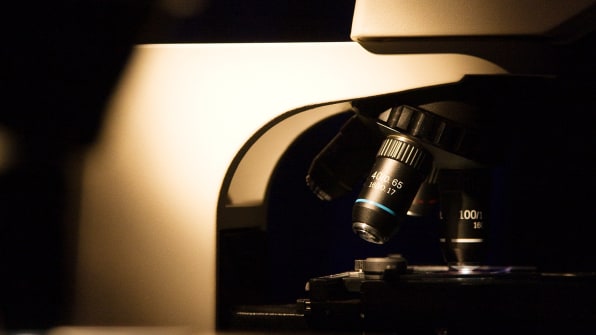How to Stop Your Metasticized Cancer Ebook Mary Jo Parker Reviews
Sean Parker is deathly allergic to peanuts. If he accidentally eats a rogue nut and doesn't receive an epinephrine injection, he will end animate.
Parker's struggle with life-threatening allergies hasn't stopped him from achieving fortune (as the first investor in Facebook), fame (Justin Timberlake played him equally a charismatic hustler in the film The Social Network), and a track tape for irresolute entire industries (remember Napster?). It did, all the same, inspire him to spend endless hours in an Internet rabbit hole researching the mysteries of the homo immune response.
"I'm totally fascinated by the immune arrangement," he told me by phone this week, while trying to escape the New York rain. "Like my interest in other scientific fields, I took a deeper swoop and got more and more than invested."
In Dec 2014, he got his feet wet past making a $24 million donation to the Stanford Academy School of Medicine, which is earmarked for allergy research. Today, he is announcing the $250 million-funded Parker Institute, a research effort to develop targeted therapies to treat cancer, which is noteworthy in its ability to evade the immune system. That's the single largest financial contribution to the field of immunotherapy always. It'southward likewise Parker's well-nigh ambitious effort in biotech.
To discover breakthrough therapies, Parker has personally helped recruit a brain trust of more twoscore laboratories and 300 researchers from the top cancer centers, including Physician Anderson, Memorial Sloan Kettering, Penn Medicine, Stanford, and the University of California, San Francisco (UCSF). Strategic advisers include Jeff Huber, a longtime Googler who is at present working to develop a claret examination for cancer detection, and executives from a multifariousness of pharma companies including Amgen and Merck. Dr. Jeff Bluestone, a well-known researcher and a former provost at UCSF, is leading the initiative as its chief executive offer. "I've been post-obit the explosion of cancer immunotherapies in the past v years," Bluestone says. "I met Sean a few times, and he asked if I'd join."
Parker seems confident he tin create momentum outside the ivory towers of medical inquiry, even though $250 million is a drop in the bucket compared to the costs of drug development, which is typically in the billions. The Parker Institute is hoping that its partners, the pharmaceutical companies, will fund the early on clinical trials and shoulder the costs of bringing a new therapy to market. "From my perspective as an entrepreneur, I know we tin see results faster," he says. He's identified 2 major flaws with research today: The lack of collaboration betwixt researchers, and the frequent intellectual belongings disputes over new technologies.
As a condition of partnering with the Parker Institute, researchers are expected to work with each other instead of pursuing personal glory. They must as well concur to license any new engineering they develop through the plant. After watching scientists behind one of almost of import biotech breakthroughs in recent history, a gene-editing engineering science known as CRISPR, become embroiled in a messy legal boxing over patents, Parker is drastic to avoid a scenario in which technologies sit down on the shelf for decades while researchers duke it out in court.
"I joke around that if you were to roll back the clock and design an manufacture or field that would produce a breakthrough technology for treating patients and curing affliction, this is the last structure you would come with," Parker adds.

The Cancer Moonshot
In 2011, Parker's good friend, the legendary film producer Laura Ziskin, passed abroad from breast cancer. The two had oft discussed the potential of immunotherapy, which was besides a subject close to Ziskin'southward center. After she died, Parker gear up virtually quietly deploying capital into immunotherapy. "I set up a dream team in the scientific establishment, which hadn't embraced the idea yet," he says.
But the field quickly entered into a kind of renaissance. Today, immunotherapy is central to the Obama Assistants's "moonshot" to cure cancer. Vice President Joe Biden recently predicted that immunotherapy will progress cancer research more than in the next ten years than it has in the by l.
Broadly speaking, cancer immunotherapy researchers seek to understand the mechanisms by which cancer cells evade detection. They are bringing new therapies to market, notably allowed checkpoint inhibitors, which assistance the immune system recognize and target cancer cells as foreign. These therapies are more specific than chemotherapy, which causes damage to many good for you cells.
"The way I describe it to my patients is to think about the terminal time they had a bacterial infection and got really sick," says Dr. Dale Shepard, a medical oncologist at the Cleveland Clinic. "That'southward an example of a robust allowed response." By dissimilarity, some of Shepard'southward patients have avant-garde cancers that nowadays with few symptoms. "I see patients all the fourth dimension that have v-inch tumors that are totally ignored by the immune arrangement."
Oncologists like Shepard are charily optimistic nearly the prospects of cancer immunotherapy, as they've seen it work firsthand. Some of the newest treatments, which have been nearly effective at treating kidney, colon, prostate, and lung cancers, accept brought some of Shepard'south patients with avant-garde tumors dorsum from the brink of decease. The therapies have fifty-fifty proved tolerable to nonagenarians, like onetime president Jimmy Carter. But for some patients, such as those with slower-growing cancers, the response has been minimal at best.
That said, cancer immunotherapy is not quite a home run still. The side by side footstep for researchers is to ameliorate empathize why some patients aren't receptive to immunotherapies at all, while others show almost-miraculous comeback. Oncologists are also hoping to meet new therapies for hematologic cancers, similar leukemias and lymphomas. Some 1,500 cancer immunotherapy drugs are currently in the research and development pipeline.
Bluestone, who is heading up the Parker Initiative, has already scoped out some near-term inquiry initiatives for the coming year, such every bit new ways to modify T-cells (the immune system's anti-cancer warriors) to better recognize and impale cancer cells. Additionally, the initiative will provide sophisticated technology to labs such as machines for Deoxyribonucleic acid sequencing. And Bluestone is researching how to utilize medical imaging technology, which tin offer a three-dimensional picture of tissues and tumors to ameliorate understand how these cells communicate with each other. "We desire to wait deeper than ever before," he says. "We desire to identify what cancers come up dorsum, and seek out subtle changes in the immune system that we tin exploit."

Challenging The Condition Quo In Research
Dr. Prateek Mendiratta is a clinical acquaintance of medicine at Duke Cancer Center. He treats patients with cancer every day, and is keeping a watchful eye on developments in the field of immunotherapy. I enquire Mendiratta for his thoughts on Sean Parker making a big bear upon in the space.
"Oh wow," he said, seemingly puzzled that a household-proper name tech billionaire would want to plant a flag in this particular expanse of research. Just on further reflection, Mendiratta came around to the thought of Silicon Valley types investing their time and resources into the space. "We have to go on thinking outside the box," he says. "If more patients can see durable responses and remissions, I'm excited to see people outside of the industry pace in."
The oncologists I spoke to recognized that physicians desperately need a new set of tools to treat patients. And if an outsider from the tech industry can exercise it, all power to them.
For his part, Parker asks every researcher who wants to get involved about the projects they wish they were doing (a very Silicon Valley question). He says he wants to fund the ideas that take been deemed "too complicated or too ambitious" for the condition quo.
Shepard is ready for this kind of thinking. "It's a daily frustration for me that traditional chemotherapies don't work as well equally we'd like," he says. "I call back plenty people are willing now to stand up and do the correct thing for patients, even if that ways changing the manner we do things."
Sean Parker on why Facebook never should have won:
Source: https://www.fastcompany.com/3058827/inside-sean-parkers-250-million-bet-to-cure-cancer
0 Response to "How to Stop Your Metasticized Cancer Ebook Mary Jo Parker Reviews"
แสดงความคิดเห็น